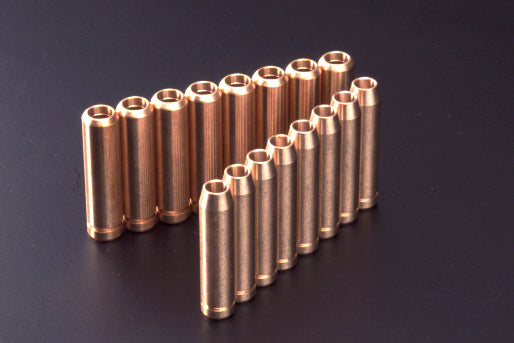1
/
of
1
TOMEI
Tomei VALVE GUIDE SET For SILVIA S14 S15 SR 163049
Tomei VALVE GUIDE SET For SILVIA S14 S15 SR 163049
Regular price
£230.00
Regular price
Sale price
£230.00
Unit price
/
per
Taxes included.
Shipping calculated at checkout.
Some items may take 3-5 days to ship.
Couldn't load pickup availability
We chose to use Phosphor Bronze (Cn-Sn-P alloy) to make our Valve Guides, for its highly tensile and superior heat transferring ability, which is vital in high power and high RPM outputting engines. Since race engines these days require more power at higher RPM use , these engines now experience more extreme heat conditions. These conditions will increase the deterioration rate on these valve train related components. The Phosphor Bronze material has exceptionally lower friction and the best possible clearances can be maintained, which will reduce the stress on the valve train assembly, prevent seizures and cracking under high stress loads.
PRODUCT INFO
| APPLICATION | IN/EX | P/N | |
|---|---|---|---|
| SR20DE(T) RPS13/PS13 |
SET | 163048 | |
| IN | 161096 | ||
| EX | 161098 | ||
| SR20DET S14/S15 |
SET | 163049 | |
| IN | 161097 | ||
| EX | 161098 |
FEATURE / SPEC
| MATERIAL | 5191(Cn-Sn-P alloy) |
|---|---|
| TENSILE STRENGTH | 590~685(N/㎜2) |
| HARDNESS | 180~230(HB) |
Still since the product will be used for extreme conditions, it will still require additional regular maintenance and periodical checks. The product can wear out faster under certain conditions. Some examples of the abnormal conditions are as follows.
■The rocker arm type assemblies will apply more lateral pressure, which will increase the wear rate. If the stem wall of the valve is rough, it will also contribute to the increased wear rate.
■Using high lift, aggressive camshafts will also increase the wear rate.
■Excessive buildup of carbon will also hinder performance and increase wear rate. When there’s a small opening at the end, it will increase the carbon buildup rate as a funnel effect.
■The results from Valve Spring surging will cause the Valve to move on an angle. This will cause both ends to open up and create deformation. Then carbon can enter the valve guides more which will increase the wear rate.
■A defective seat cut. When the seat cut’s centerline across the main 45 degree face is offline from the valve stems centerline by more than 0.01mm, this can cause increased abnormal wear rate.
■If the clearance is not within the correct 0.03-0.04mm range. The Valve will rub against the guides inner wall, this degree angle in relation to the seat cut will cause it to shift by 0.01mm more than the clearance values. The guide will take the lateral pressure point and open up the opening. The buildup of carbon will increase in the newly formed gaps.
■A worn out used Valve. It’s possible to cut down by using the part that has not worn out the stem when changing to a high lift cams. The guides can wear out when the inappropriate clearances are made. (About 0.01mm out of clearance).
■The Valve design is defective. The difference from the dilatability and the guide being worn out abnormally is when the valve that is made with different alloys, will contribute with a faster deterioration.
Share


